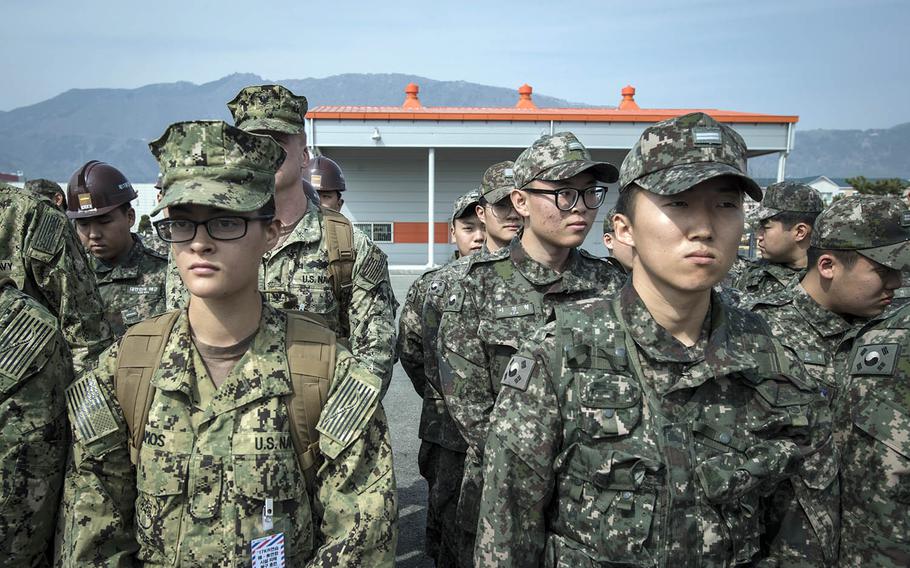
U.S. and South Korean sailors listen to a safety briefing during a Foal Eagle exercise in Jinhae, South Korea, March 13, 2017. (Torrey Lee/U.S. Navy)
SEOUL, South Korea — The U.S. and South Korean militaries reportedly plan to begin joint war games later this month, suggesting that they will overlap with a planned inter-Korean summit in late April.
The allies agreed to postpone the annual drills until after the Feb. 9-25 Olympics and the Paralympics, which begin Thursday in the South Korean alpine town of Pyeongchang.
But the Trump administration said the delay was strictly to “deconflict the Olympics,” and both countries vowed to resume the military exercises after the Winter Games.
The start date has not been officially announced, but NBC News quoted three U.S. officials as saying that the exercise known as Foal Eagle would begin on March 31 and run through May. The unidentified officials said a simultaneous computer simulated drill known as Key Resolve would be held from mid to late April.
A South Korean official, who spoke on condition of anonymity because he wasn’t authorized to disclose the information, also told Stars and Stripes that the exercises would take place in April. Senior presidential adviser Moon Chung-in also told a seminar in Washington last month that he was “aware the drills will begin in the first week of April,” according to the Yonhap News Agency.
That would mean the war games would likely be ongoing if South Korean President Moon Jae-in meets with North Korean leader Kim Jong Un in late April in the tense border area as announced on Tuesday.
The war games are a sensitive subject on the divided peninsula because they usually infuriate North Korea, which considers them a rehearsal for an invasion and has demanded that they be suspended.
But South Korean envoys who met with Kim Jong Un earlier this week informed the 34-year-old leader that it wasn’t feasible to postpone the military drills and he replied that he understood that they would take place in April on a similar scale to previous years, officials said. “North Korea made its position clear that it isn’t going to take the U.S.-South Korean joint military exercises as a problem anymore,” chief envoy Chung Eui-yong said Wednesday during a meeting with Moon and political leaders. “Even if we hold the military exercises inter-Korean relations won’t collapse.” U.S. Forces Korea said on Feb. 20 that it intended to conduct the exercises “as planned — to include the scope and scale — as part of maintaining a foundation of military readiness.”
South Korean Defense Minister Song Young-moo has promised to announce the start date for the drills after the Paralympics conclude on March 18.
The military has not changed its position, USFK spokesman Col. Chad Carroll said.
“We will see where the current environment takes us with regards to the exercises,” he said in an email. “Seoul and DC are saying the same thing, however ... that we plan to conduct them at a similar ‘scope and scale’ to previous iterations.”
He said the allies intend to publish the dates following the Paralympics, “after 18 March or so” in line with the defense minister’s promise.
U.S. and South Korean commanders insist the drills are defensive in nature and necessary to maintain readiness.
Foal Eagle is a field training exercise involving tens of thousands of U.S. and South Korean ground, air, naval and special operations forces. Many of the American troops come from off the peninsula to participate.
Key Resolve is a command post exercise that usually takes place simultaneously and lasts about 10 days.
Another massive joint exercise known as Ulchi Freedom Guardian is held in the fall.
The two Koreas have been bitter enemies since their 1950-53 war ended in an armistice instead of a peace treaty. About 28,500 U.S. servicemembers are stationed in the South.
Tensions have risen over the past two years as the North made rapid progress toward its goal of developing a nuclear weapon that could target the U.S. mainland. But the détente fostered by its participation in the Olympics has led to a series of diplomatic breakthroughs.
In addition to the inter-Korean summit, Kim Jong Un said he was willing to negotiate with the U.S. on abandoning his nuclear weapons program and to freeze missile and nuclear tests while the talks were underway, the South Korean envoys said.
South Korea’s president, who took office in May promising to pursue engagement with the North, expressed hope on Wednesday that the offer would create the right conditions for at least “preliminary talks” on denuclearization.
“We have now come to a very critical juncture in our efforts to establish peace and denuclearize the Korean Peninsula,” Moon said during a meeting with political leaders at his office, according to a transcript. “I believe it is still too early to be optimistic because we are only at the starting line.”
Trump also responded cautiously, saying he believes the sudden about-face by the North Koreans was due to punishing economic sanctions imposed by the U.S., South Korea and the U.N. Security Council.
“I believe they are sincere. I hope they’re sincere,” he told reporters Tuesday at the White House.
gamel.kim@stripes.com
Twitter: @kimgamel